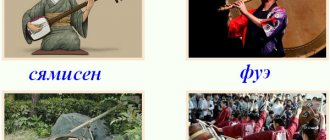About the book "Hagakure"
Hagakure translated into Russian means “hidden in the leaves.” This is a treatise on the Samurai Code of Honor - Bushido. The main idea that this work carries is adherence to the Code. Every samurai walks the "Path of Death" or lives "as if the warrior were already dead." This means that he must be ready to die at any moment in order to preserve his honor. According to Hagakure Kikigaki:
If there are two paths to choose from, there is only a quick and only way out - death.
This is the main idea and quote of the Samurai Code.
Most of the book is devoted to the life and role of the samurai in peacetime. The most interesting thing is that in non-war times the life of a Japanese warrior is entirely devoted to preparation: physical, moral, psychological, so that at the right moment he can immediately commit that very act - refusing personal gain, in an extreme situation, carry out the order - commit hara-kiri (or do it voluntarily , if the honor of the “servant” is affected).
The Hagakure contains an endless number of instructions, following which you can change your life for the better.
In a nutshell about hara-kiri
Harakiri literally means “ripping open the abdomen.” This form of suicide was used in cases where the honor of a warrior was affected, or by sentence - as a sign of devotion to his master - the daimyo (and in other similar cases).
Wounds to the abdomen are the most painful, unlike other parts of the body.
When, for one reason or another, a samurai could not perform the seppuku ritual, his dagger was replaced with a fan. The samurai touched his stomach with a fan, and at that moment his assistant beheaded him.
The role of women in samurai culture
Surprisingly, women could also be samurai. Their main duty of honor is devotion to their husband, the same as the devotion of a samurai to their lord. She could take on the role of an avenger for her husband; in his absence, she took upon herself to protect the house from enemies.
The Code also allowed the weaker half of humanity to master military skills. But, as a rule, the emphasis was on daggers. So, a woman always carried a short blade with her, hiding it in her hair or under her clothes. They also had a special suicide ritual called jigai, which involved cutting the throat.
Samurai Code of Honor - Bushido
Bushido means "way of the warrior" in Japanese. Initially, it was a collection of postulates about the behavior of a warrior in general. But under the influence of Japanese culture in the 12th century, Bushido was transformed into a separate set of rules for Japanese warriors - samurai.
The main idea of the Code of Honor is that a warrior can die at any moment and must be aware of this. He must live and appreciate every minute of his life. Samurai quote: “Only that person is ready for death who lives life to the fullest.” The duty of a samurai is to devote all his free time to self-development and helping people.
There are 7 basic principles of a samurai: respect, justice, courage, virtue, honor, devotion and sincerity. All these qualities are signs of a true warrior. Thanks to proper upbringing it was possible to acquire these qualities.
Yamamoto Tsunetomo - the great samurai
Yamamoto Tsunetomo (also called Yamamoto Zete) is one of the most prominent representatives of samurai culture of the 17th-18th centuries. Having become a monk in adulthood, he told many of his thoughts to his friend Tsuramoto Tashiro. Soon the legendary samurai left this world in 1716. His philosophical reflections were collected and published as a separate book called Hagakure. This treatise was practically unknown until the beginning of the 20th century. Only since the 1930s has it become one of the most famous works explaining the ideas of Bushido.
Quotes from Japanese writers
Have you ever read a book on the subway and then look up and stare into space for several minutes? Or seeing this happen to other reading passengers? I wouldn’t be surprised if on the cover of such a book was the name of Haruki Murakami, who is capable of literally bewitching, introducing readers into a state of altered consciousness, when a description of the simple process of preparing pasta can easily lead to a new understanding of the world and self-awareness.
The most talented Japanese writers conduct a difficult conversation with readers about the impermanence of life and the inevitability of death with their characteristic fatalism in the perception of all things. And they do it beautifully and gracefully, striving for perfection in everything.
Perhaps by getting to know them, you will also learn to think outside the box.
Haruki Murakami
“In time you will understand. What lasts lasts. What doesn't happen doesn't happen. Time resolves most things. And what time cannot decide, we must decide ourselves.” ("Dance, dance, dance")
“What the world is, after all: an endless battle of conflicting memories.” (1Q84")
“Pain is inevitable. Suffering is not necessary." (“What do I talk about when I talk about running”)
Junichiro Tanizaki
“They say that Japanese dishes are not meant to be eaten, but to be admired. I would even say - not so much to admire as to indulge in dreams. The effect they exert is like a silent symphony performed by an ensemble of candle flames and lacquerware.” ("Praise of the Shadow")
“I learned that the more a man hates a woman, the more beautiful he thinks she is. Don José killed Carmen because the more he hated her, the more beautiful she seemed to him. ("A Fool's Love")
“Just think what trifles, what random coincidences sometimes determine human destiny!” ("Fine Snow")
Yukio Mishima
“Beauty gives no consolation to the mind. She serves as his mistress, wife, but not as a comforter. However, this marriage union brings its own child. The fruit of marriage is ephemeral, like a soap bubble, and just as meaningless. It is commonly called art” (“Golden Temple”)
“Curiosity knows no ethics. This is perhaps the most immoral of human passions.” ("Confession of a Mask")
“Simplicity is the highest point of contact between life and art. Anyone who despises simplicity evokes only pity - for thereby he admits defeat. If a person is afraid of simplicity, it means he is far from mature.” ("Thirst for Love")
“Humans are strange creatures. We defile everything we touch, but in our souls we have all the makings of becoming saints.” ("Spring Snow")
Yasunari Kawabata
“Time flows the same for all people; each person flows through time in his own way.”
“Successes and failures in the lives of parents are the successes and failures of their children in family life.” ("The Moan of the Mountain")
“It’s already autumn—touch her hair and shiver from its coolness.” ("Stories in the Palm")
Natsume Soseki
“Having received a scanty education, a person works until he is completely exhausted and as a result becomes a neurasthenic. Talk to anyone. He's usually dumb. He doesn't care about anything, only about himself. I lived through the day and it was okay. And what can you do if people are so exhausted that they are not able to think? ("Then")
“If money, power and eloquence could attract the hearts of people, then people would probably love money lenders, policemen and university professors most of all.” ("Boy")
“In this world it is better for a person to be straight, without corners. A round object rolls safely, but an angular one only breaks its sides and runs into trouble at every step.” (“Your humble servant cat”)
Banana Yoshimoto
“Books and music - we ourselves don’t notice how they save us every day, every hour. Vital little things. Real gifts of fate, even if we don’t fully realize it.” ("Amrita")
“People don’t care about circumstances or external forces, they fail within themselves.” ("Kitchen")
“If a person spends too much time in what he thinks is a safe room, he gradually becomes part of the house, another piece of furniture. It’s easy to notice such people on the street - their clothes and facial expressions are homelike. They move like somnambulists, looking at one point. They have forgotten what it means to live in freedom.” ("Amrita")
Natsuo Kirino
“Fate is what happens to you against all your plans.” ("Out")
“Children feel humiliation most acutely; there are no more vulnerable creatures. Because they don't know how to cope with humiliation. They don’t have such skills.” ("Chronicle of Cruelty")
“The more a man tries to raise his value, the more his inner emptiness becomes apparent.” ("Tender Cheeks")
Ryunosuke Akutagawa
“My mind allowed me to understand the powerlessness of reason”
“Everyone wants freedom. But it only seems so from the outside. In fact, deep down, no one wants freedom. Freedom is like mountain air. For the weak it is intolerable."
“Life is like a box of matches. Treating her seriously is stupider than stupid. Not being taken seriously is dangerous.”
“Calling a despot a despot has always been dangerous. And these days it is just as dangerous to call slaves slaves.”
Who are samurai?
The term "samurai" comes from the Japanese word "samurau", which means "to serve". Accordingly, a samurai literally means “servant.”
Samurai as a caste (class) existed throughout the history of Japan. They, as a rule, served aristocrats. But centuries later, bushi (the second name for samurai, which means “warrior”), having united into large clans, gained independence and power. Therefore, they stopped serving carriers of aristocratic blood.
Over the years, clans replaced each other, fighting for the honorary title of shogun - general, leader of Japan. He had real power, unlike the emperor. Probably the most important thing in the life of Japanese warriors is the way of the samurai. Quote from Yamamoto:
Don't let others surpass you in the way of the samurai.
These words highlight their strict self-discipline. It is difficult to imagine what qualities and power one had to have to become a shogun.











